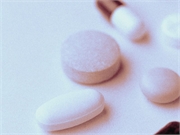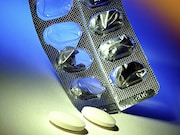Tag: Proton Pump Inhibitors
Risk for COVID-19 Increased for Adults Taking PPIs
Dose-response relationship observed; risk up 3.67-fold for those using PPIs up to twice daily
Guidelines Issued for Managing Eosinophilic Esophagitis
Topical glucocorticosteroids recommended over no treatment
Suppressing Stomach Acid May Up Intestinal Growth of MDROs
Gastric acid suppression increased odds of intestinal colonization with MDROs by about 75 percent
Proton Pump Inhibitor Therapy May Up Fracture Risk in Children
Fracture risk remained higher after adjusting for differences in sex, race, other factors
Proton Pump Inhibitors May Up Fracture Risk in Children
Small but significant risk seen for upper-limb and lower-limb fractures
Use of PPIs Tied to Cognitive Issues in Breast Cancer Survivors
Concentration, memory problems reported in breast cancer patients at different stages of survivorship
Half of Patients on PPIs for GERD Still Have Persistent Symptoms
Heartburn, regurgitation reported by 54.1 percent of participants taking proton pump inhibitor daily
Continuous PPI Use May Increase Risk for Acute Gastroenteritis
Risk for acute gastroenteritis icreased for all ages combined and for those aged 45 to 64, 65 to 74, ≥75
Antacid Use in First Year of Life Tied to Later Fracture Risk
Findings seen among healthy infants taking proton pump inhibitors alone or with histamine H2-receptor antagonists
PPI Use for Up to Three Years Safe During Anticoagulant Tx
Safety profile did not differ for pantoprazole versus placebo except greater risk for enteric infections














